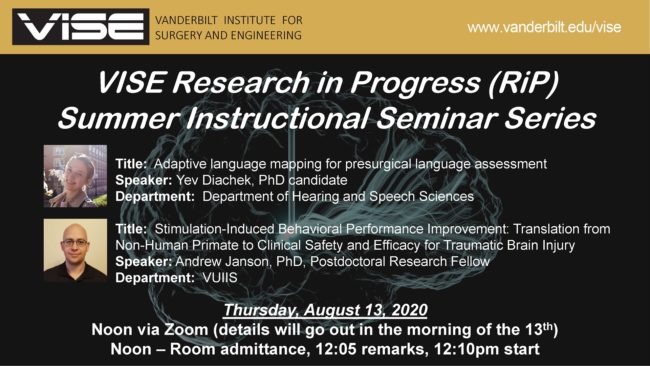VISE Summer Instructional Seminar – 8.13.20
VISE Research in Progress (RiP)
Date: Thursday, August 13, 2020
Time: Noon admittance, 12:05 p.m. remarks, 12:10 p.m. start
Time: Noon admittance, 12:05 p.m. remarks, 12:10 p.m. start

Speaker #1:
Yev Diachek, PhD Candidate
Title:
“Adaptive language mapping for presurgical language assessment”
Yev Diachek, PhD Candidate
Title:
“Adaptive language mapping for presurgical language assessment”
RiP #1 Talk Description:
Functional magnetic resonance imaging (fMRI) is a safe, non-invasive method commonly used preoperatively for language mapping in neurosurgery patients. In an ongoing study, we are comparing standard language mapping paradigms to novel adaptive paradigms in which stimulus difficulty is dynamically modulated according to individual performance. Our preliminary results (n = 37) suggest that adaptive language paradigms are more robust for determining language lateralization compared to standard paradigms
Functional magnetic resonance imaging (fMRI) is a safe, non-invasive method commonly used preoperatively for language mapping in neurosurgery patients. In an ongoing study, we are comparing standard language mapping paradigms to novel adaptive paradigms in which stimulus difficulty is dynamically modulated according to individual performance. Our preliminary results (n = 37) suggest that adaptive language paradigms are more robust for determining language lateralization compared to standard paradigms
and
Speaker #2:
Andrew Janson, PhD, Postdoctoral Research Fellow
Title:
“Stimulation-Induced Behavioral Performance Improvement: Translation from Non-Human Primate to Clinical Safety and Efficacy for Traumatic Brain Injury”
Andrew Janson, PhD, Postdoctoral Research Fellow
Title:
“Stimulation-Induced Behavioral Performance Improvement: Translation from Non-Human Primate to Clinical Safety and Efficacy for Traumatic Brain Injury”
RiP #2 Talk Description:
The central thalamus (CT) is an important component of the arousal regulation system in the brain and damage to this structure, as a result of severe brain injury, is linked to chronic cognitive impairment. Deep brain stimulation within the central thalamus (CT-DBS) has been proposed as a therapeutic strategy to improve arousal regulation and cognitive impairments in patients with traumatic brain injury (TBI). Our nonhuman primate studies are being translated into human DBS in the form of surgical targeting plans and stimulation parameters that can provide therapeutic benefit for patients with chronic cognitive deficits as a result of TBI
